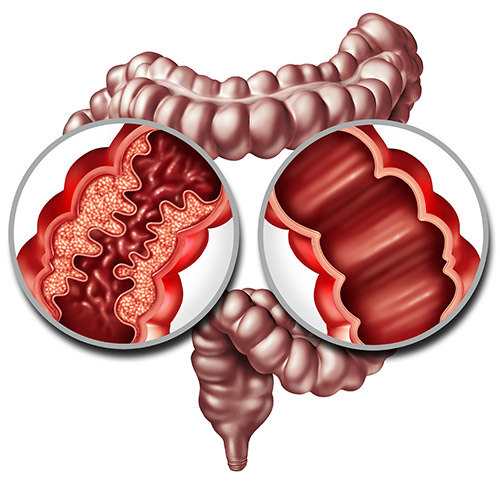Crohn's/IBD
Get TestedInflammatory bowel disease (IBD) is the umbrella term for chronic inflammatory conditions occurring in the digestive tract. Crohn’s disease, ulcerative colitis (UC), and microscopic colitis are classified as inflammatory bowel diseases. Some individuals may have what is called indeterminate colitis as they may have features of more than one condition. Several factors are involved in the development of IBD including genetics, environment, gut microbes, immune activity, and diet.
The two most commonly diagnosed inflammatory bowel diseases are Crohn’s disease and UC. Crohn’s disease can occur throughout the entire digestive tract, anywhere from the mouth to the rectum and affects the entire thickness of the digestive lining. On the other hand, UC occurs only on the surface of the digestive lining and is confined to the large intestine (colon) and rectum.

Signs and Symptoms
Signs and symptoms of IBD include cramping, diarrhea, food intolerances, weight loss, malnutrition, bleeding, and inflammation. Those with IBD may also experience nutrient deficiencies as a result of decreased absorption in the small intestine (Crohn’s) and/or the large intestine (Crohn’s and UC).
Weight loss is most common in IBD due to decreased nutrient intake and malabsorption (Crohn’s in particular), although obesity is also possible due to inflammation and an imbalance or elevation in hormones, such as insulin and cortisol.
Testing related to IBD
Your healthcare provider may want to order tests that measure antibodies in your blood that are related to Crohn’s and UC. Your provider may order additional tests as well, such as genetic testing, micronutrient testing, and testing for increased intestinal permeability, among others. A CICA test (Celiac, IBS, Crohn’s Array) may be ordered to help rule out celiac disease and test for genetic predisposition to Crohn’s and celiac disease.
The Role of Food Sensitivities
An anti-inflammatory eating pattern can help decrease inflammation and reduce tissue damage. Since food sensitivities may contribute to inflammation and/or exacerbate symptoms of IBD, it is recommended to identify these foods and take steps to avoid them. Learn more about food sensitivities and the Alcat Test here.
“I was diagnosed with Ulcerative Colitis. The medical doctor who had diagnosed me had informed me that my condition had to be treated with Western medication and that it was quite likely that the medications would have to be taken for the rest of my life.I wanted more options and more control over my body. I decided to work with a nutritionist for support and guidance. The recommended dietary changes did initially relieve my symptoms but after a few weeks they returned. Frustrated with the reoccurring pain, bloating, and bleeding, I agreed to take the Alcat Test. The test was simple and yet the results were life changing. Many of the “healthy foods” I was consuming daily were simply not right for my body and were causing inflammation. The list of foods to avoid was long but most importantly, it was a list I could have never come up with myself. Foods like black pepper, red lettuce and pears were making me sick. There were approximately 300 food items on the list. After only 3 days of eating the allowed foods I felt better. The pain, bloating and bleeding had stopped. After the first week, I was back to myself. It has been almost a year and I have not taken one pill. I feel great. I am proof that when the body is given what it needs, it will heal itself.”
– Luz
New Jersey
Receive Our IBD Fact Sheet!
Sign up for our newsletter and receive a complimentary IBD Fact Sheet that includes information about this disorder and the 5R protocol we use with our clients.
